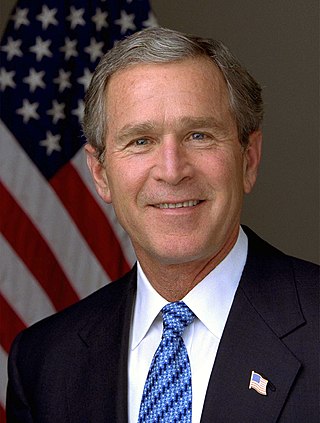
George Herbert Walker Bush was an American politician, diplomat, and businessman who served as the 41st president of the United States from 1989 to 1993. A member of the Republican Party, he also served as the 43rd vice president from 1981 to 1989 under Ronald Reagan, and in various other federal positions prior to that.

The 2000 United States presidential election was the 54th quadrennial presidential election, held on Tuesday, November 7, 2000. Republican candidate George W. Bush, the incumbent governor of Texas and eldest son of the 41st president, George H. W. Bush, won the election, defeating incumbent Vice President Al Gore. It was the fourth of five American presidential elections, and the first since 1888, in which the winning candidate lost the popular vote, and is considered one of the closest U.S. presidential elections, with long-standing controversy about the result. Gore conceded the election on December 13.

The 1988 United States presidential election was the 51st quadrennial presidential election held on Tuesday, November 8, 1988. The Republican nominee, incumbent Vice President George H. W. Bush, defeated the Democratic nominee, Governor Michael Dukakis of Massachusetts.

Bushisms are unconventional statements, phrases, pronunciations, possible Freudian slips, malapropisms, as well as semantic or linguistic errors in the public speaking of former President of the United States George W. Bush. The term Bushism has become part of popular folklore and is the basis of a number of websites and published books. It is often used to caricature the former president. Common characteristics include malapropisms, the creation of neologisms, spoonerisms, stunt words and ungrammatical subject–verb agreement.

George W. Bush's tenure as the 43rd president of the United States began with his first inauguration on January 20, 2001, and ended on January 20, 2009. Bush, a Republican from Texas and the eldest son of George H. W. Bush, took office following a narrow victory over Democratic incumbent vice president Al Gore in the 2000 presidential election. Four years later, in the 2004 presidential election, he defeated Democrat nominee John Kerry to win re-election. Bush was succeeded by Democrat Barack Obama, who won the 2008 presidential election.

David Jeffrey Frum is a Canadian-American political commentator and a former speechwriter for President George W. Bush. He is currently a senior editor at The Atlantic as well as an MSNBC contributor. In 2003, Frum authored the first book about Bush's presidency written by a former member of the administration. He has taken credit for the famous phrase "axis of evil" in Bush's 2002 State of the Union address.

William Lewis Safire was an American author, columnist, journalist, and presidential speechwriter. He was a long-time syndicated political columnist for The New York Times and wrote the "On Language" column in The New York Times Magazine about popular etymology, new or unusual usages, and other language-related topics.
Compassionate conservatism is an American political philosophy that stresses using conservative techniques and concepts in order to improve the general welfare of society. The philosophy supports the implementation of policies designed to help the disadvantaged and alleviate poverty through the free market, envisaging a triangular relationship between government, charities and faith-based organizations. The term entered mainstream parlance between 2001 and 2009, during the administration of US President George W. Bush. He used the term often to describe his personal views and embody some parts of his administration's agenda and policy approach.

Paul Edward Begala is an American political consultant and political commentator, best known as the former advisor to President Bill Clinton.

Richard Furman Reeves was an American writer, syndicated columnist, and lecturer at the Annenberg School for Communication at the University of Southern California in Los Angeles.

During the presidency of George W. Bush, several American politicians sought to either investigate Bush for possible impeachable offenses, or to bring actual impeachment charges on the floor of the United States House of Representatives Judiciary Committee. The most significant of these efforts occurred on June 10, 2008, when Congressman Dennis Kucinich, along with co-sponsor Robert Wexler, introduced 35 articles of impeachment against Bush to the U.S. House of Representatives. The House voted 251 to 166 to refer the impeachment resolution to the Judiciary Committee on June 11, where no further action was taken on it. Bush's presidency ended on January 20, 2009, with the completion of his second term in office, rendering impeachment efforts moot.

George Walker Bush is an American politician who served as the 43rd president of the United States from 2001 to 2009. A member of the Republican Party, he previously served as the 46th governor of Texas from 1995 to 2000.
These are the references for further information regarding the history of the Republican Party in the U.S. since 1854.
The bibliography of Ronald Reagan includes numerous books and articles about Ronald Reagan. According to J. David Woodard, a political science professor, more than 11,000 books on Reagan have been published.

George W. Bush served as the 46th governor of Texas from 1995 until 2000, when he resigned as governor amid his transition into the U.S. presidency after having been elected president in the 2000 United States presidential election. As governor, Bush successfully sponsored legislation for tort reform, increased education funding, set higher standards for schools, and reformed the criminal justice system. Bush also pioneered faith-based welfare programs and helped make Texas the leading producer of wind powered electricity in the US.

George H. W. Bush's tenure as the 41st president of the United States began with his inauguration on January 20, 1989, and ended on January 20, 1993. Bush was a Republican from Texas and the incumbent vice president for two terms under president Ronald Reagan. Bush took office following a victory over Democrat nominee Michael Dukakis in the 1988 presidential election. His presidency ended following his defeat in the 1992 presidential election by Democrat Bill Clinton. Bush was the father of the 43rd president, George W. Bush.

Books about and authored by Jimmy Carter, the 39th president of the United States (1977–1981).
The rhetorical presidency is a political communication theory that describes the communication and government style of U.S. presidents in the twentieth century. This theory describes the transition from a presidency that directed rhetoric toward the United States Congress and other government bodies, to one that addresses rhetoric, policy and ideas directly to the public.
This bibliography of Bill Clinton is a selected list of generally available published works about Bill Clinton, the 42nd president of the United States. Further reading is available on Bill Clinton, his presidency and his foreign policy, as well as in the footnotes in those articles.
















